Text
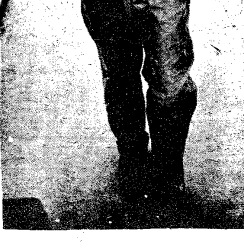
god damn
1 note
·
View note
Text



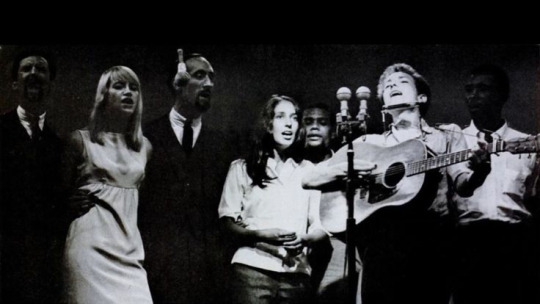
Peter Yarrow, Mary Travers, Paul Stookey, Joan Baez, Bob Dylan, Bernice Reagon, Cordell Reagon, Charles Neblett, Rutha Harris, Pete Seeger, and Theodore Bikel at the Newport Folk Festival, July 1963.
#peter paul and mary#peter yarrow#mary travers#paul stookey#joan baez#bob dylan#bernice reagon#cordell reagon#charles neblett#rutha harris#pete seeger#peter seeger#theodore bikel#newport folk festival#newport folk fest#1963#60s#folk#folk music#music#60s folk music#photo archive#not broadside
19 notes
·
View notes
Text
"I Ain't Marching Any More" - Phil Ochs (sheet music & guitar chords)

Oh, I marched to the battle of New Orleans
At the end of the early British wars
The young land started growing
The young blood started flowing
But I ain't marching anymore
For I've killed my share of Indians
In a thousand different fights
I was there at the Little Big Horn
I heard many men lying, I saw many more dying
But I ain't marching anymore
It's always the old to lead us to the wars
It's always the young to fall
Now look at all we've won with the saber and the gun
Tell me, is it worth it all?
For I stole California from the Mexican land
Fought in the bloody Civil War
Yes, I even killed my brothers
And so many others
But I ain't marching anymore
For I marched to the battles of the German trench
In a war that was bound to end all wars
Oh, I must have killed a million men
And now they want me back again
But I ain't marching anymore
It's always the old to lead us to the wars
Always the young to fall
Now look at all we've won with the saber and the gun
Tell me, is it worth it all?
For I flew the final mission in the Japanese skies
Set off the mighty mushroom roar
When I saw the cities burning
I knew that I was learning
That I ain't marching anymore
Now the labor leader's screamin'
When they close the missile plants
United Fruit screams at the Cuban shore
Call it peace or call it treason
Call it love or call it reason
But I ain't marching anymore
No, I ain't marching anymore
#sing out#sing out!#phil ochs#folk music#60s#anti war#i ain't marching anymore#i ain't marching any more#sheet music#resource#magazine
10 notes
·
View notes
Text
There ain't too much I can say about this song except that the answer is blowing in the wind. It ain't in no book or movie or TV show or discussion group. Man, it's in the wind – and it's blowing in the wind. Too many of these hip people are telling me where the answer is but oh I won't believe that. I still say it's in the wind and just like a restless piece of paper it's got to come down some ... But the only trouble is that no one picks up the answer when it comes down so not too many people get to see and know ... and then it flies away. I still say that some of the biggest criminals are those that turn their heads away when they see wrong and know it's wrong. I'm only 21 years old and I know that there's been too many wars ... You people over 21, you're older and smarter.
bob dylan on "blowin' in the wind", sing out, june 1962
#bob dylan#blowin' in the wind#sing out#sing out!#the freewheelin' bob dylan#the freewheeling bob dylan#blowing in the wind#music#folk song#folk music#1962#60s#folk
1 note
·
View note
Text
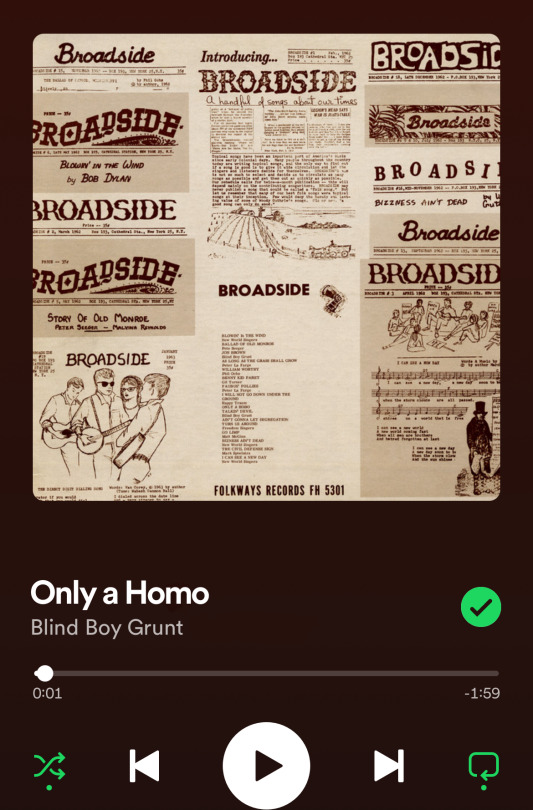
broadside ballads goes incredibly hard
4 notes
·
View notes
Text

hasn’t he suffered enough 💔💔💔
9 notes
·
View notes
Text
rip gordon friesen you would've done wonders on genius lyrics
0 notes
Text

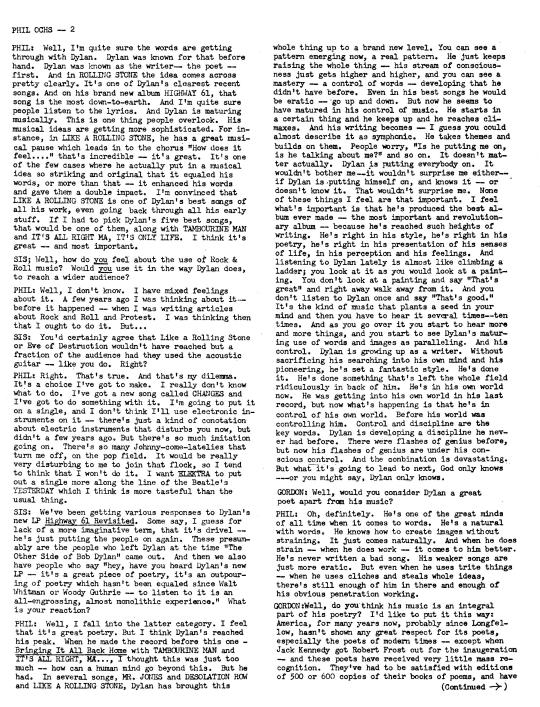
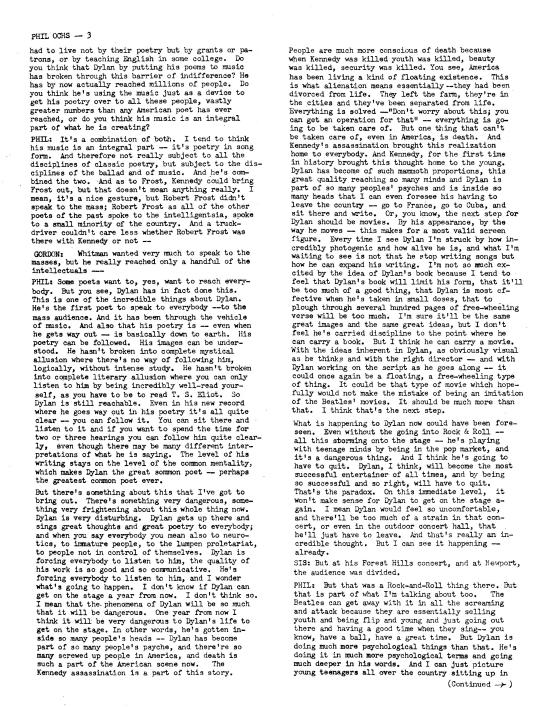
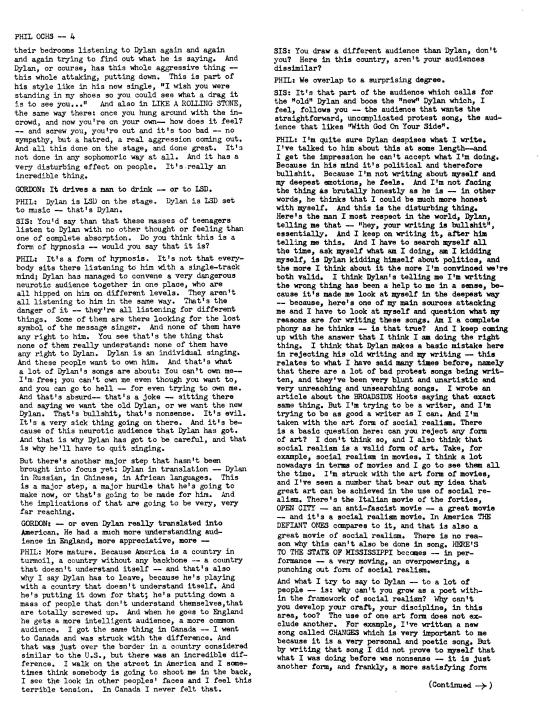

(Broadside #63, October 15, 1965)
#phil ochs#broadside#broadside magazine#broadside ballads#sis cunningham#folk#folk music#folk magazine#broadside folk#gordon friesen#60s#1965#60s folk#60s folk music
10 notes
·
View notes
Text
Newport: The Short Hot Summer (Newpork Folk Festival, 1965)
PHIL OCHS: The trouble with Newport 65 was that too many people forgot that it was supposed to be a festival. The cops were ridiculously harsh and rude. Many city performers were up tight about how well they would do professionally. And juvenile gossip seemed to be on too many peoples’ tongues. It should have been called the Newport Fuzz Festival. If people don't take it so seriously next year it should turn out to be a whole lot better.
NEWS REPORT: This year’s Newport Folk Festival was the biggest ever with 77,000 paid admissions. Festival officials plan to have next summer’s affair run a full week.
CARL MIRKEN (Broadside reporter): Fanatic screaming erupted when Bob Dylan appeared on stage Sunday night. His black leather sports jacket, red shirt, tapered black slacks and electric guitar startled some in the audience and dismayed many. Sight of the Butterfield Band backing him up deepened their dismay. By his third -- and most ‘radically’ rock and roll -- song, there was loud jeering and cat-calls from some parts of the audience. Then a regular battle between boos and cheers. Bob was obviously quite perturbed, the first time I have seen him so in front of an audience. (It must be said that he had rehearsed with the band for only an hour the night before and the poorly-balanced sound system made what could have been a great sound messy). Bob dismissed the band, exchanged his electronic guitar for his more familiar acoustic one. When a cry arose for him to sing “Mr. Tambourine Man” he responded almost apologetically “Okay, if you want me to.” And he did, and then once again he had the oldtime thunderous near-unanimous applause. All in all, it was a dramatic confrontation.
JACK SOLOMAN (manager): Dylan was out of his own element. Butterfield isn't a performer. He just lays down music.
JOAN BAEZ (performer): Tonight Bob was in a mess. He’s really very good. People just don't understand his writing.
CAROL ADLER (copywriter): This is the most hostile audience I've ever seen. I don’t understand it. Dylan completely knocked them out wherever he went in England.
THEODORE BIKEL (performer): You don’t whistle in church -- you don't play rock and roll at a folk festival.
NEW YORK TIMES (Robert Shelton): While the fresh, enthusiastic thousands of teenagers in the audiences comported themselves in a fashion that pleased Newport and festival officials, the conduct of older members of the folk leadership left much to be desired… A folklorist and a personal manager scuffled on the ground over a fine point of courtesy in the folklorist's introduction.
ALAN LOMAX (folklorist): I had been on stage for over three hours and I was hot and tired. At this point I wasn’t emceeing -- I was talking about the blues. When I came off stage there was Al Grossman and he said to me “That was the worst job of emceeing I’ve ever heard in my life.” And I said “It was no worse than some of the things you've done in your life.” Then he said something like “I ought to belt you in the nose.” I pushed my chest up against his and invited him to try it. I don’t remember swinging but there he was stretched out on the ground. Then he jumped up and grappled me around the waist and we were both down, rolling around. By that time people pulled us apart. That’s all there was to it. It couldn't have lasted more than 30 seconds. But I suppose it's already becoming a folk legend. (Editor’s note: The artist who apparently got a somewhat less than perfect introduction from Mr. Lomax belongs to Hr. Grossman’s stable).
CARYL MIRKEN (after the dust settled): The contemporary songs workshop was a high point of the festival, or could have been. It was the most eagerly awaited event and best attended. Large crowds jammed into the area the instant the gates were opened. Co-Host Peter Yarrow in a little speech said the contemporary writers are rightfully folksong writers because the whole folk tradition is with them. But although this was by far the workshop attracting the greatest interest the Newport Board this year seemed deliberately de-emphasizing contemporary songs and their writers. Most conspicuous by his absence from the program was Phil Ochs… Also absent were such of the country's leading topical songwriters as Tom Paxton and Eric Andersen. Also memorable at Newport 65: Joan Baez saluting “Johnson’s marvelous foreign policy” by singing “Stop, In The Name Of Love”... Another side of Pete Seeger: Pete managing to hang in while backing Spokes Mashiyane, the amazing South African pennywhistle jazzman (his music is really called “Kwela” but the closest term we have for it is jazz), along with Chicago blues piano player Lalayette Lee and bassist Willie Dixon. Spokes, who along with Mimi and Dick Fariña was probably the most brilliant performer at this year’s festival was brought to Newport largely through the efforts of Pete Seeger, who discovered him on his world tour a year or so ago… Fannie Lou Hamer: A great human being and a wondrous singer (“Mississippi, land of the tree and home ot the grave”)... Dick & Mimi Fariña holding an enthusiastic audience Sunday afternoon despite a sudden downpour as they sang their “House Un-American Blues Activity Dream”... Mark Spoelstra's new songs… Donovan the import from Britain is certainly much more than just an “imitation of Bob Dylan”. Donovan has his own style; his imagery is clear and meaningful without any trace at Dylan's semantic obscurity. Aside from his music Donovan is the sweetest, most “natural” guy going… John Koerner's parody of the gambler-sheriff song.
(Broadside #61, August 1965)
#newpork folk fest#newpork folk festival#newport folk festival 1965#bob dylan#phil ochs#1965#60s#broadside#broadside magazine#broadside ballads#dylan#joan baez#richard farina#mimi farina#pete seeger#newport#newport folk#folk music#folk#folk magazine
2 notes
·
View notes
Text
20-Year-Old Singer Is Bright New Face at Gerde’s Club, written by Robert [Shaprio] Shelton
A bright new face in folk music is appearing at Gerde’s Folk City. Although only 20 years old, Bob Dylan is one of the most distinctive stylists to play a Manhattan cabaret in months.
Resembling a cross between a choir boy and a beatnik, Mr. Dylan has a cherubic look and a mop of tousled hair he partly covers with a Huck Finn black corduroy cap. His clothes may need a bit of tailoring, but when he works his guitar, harmonica or piano and composes new songs faster than he can remember them, there is no doubt that he is bursting at the seams with talent.
Mr. Dylan’s voice is anything but pretty. He is consciously trying to recapture the rude beauty of a Southern field hand musing in melody on his porch. All the “husk and bark” are left on his notes and a searing intensity pervades his songs.
Mr. Dylan is both comedian and tragedian. Like a vaudeville actor on the rural circuit, he offers a variety of droll musical monologues: “Talking Bear Mountain” lampoons the over-crowding of an excursion boat, “Talking New York” satirizes his troubles in gaining recognition and “Talking Havah Nagilah” burlesques the folk-music craze and the singer himself.
In his serious vein, Mr. Dylan seems to be performing in a slow-motion film. Elasticized phrases are drawn out until you think they may snap. He rocks his head and body, closes his eyes in reverie and seems to be groping for a word or a mood, then resolves the tension benevolently by finding the word and the mood.
He may mumble the text of “House of the Rising Sun” in a scarcely understandable growl or sob, or clearly enunciate the poetic poignancy of a Blind Lemon Jefferson blues: “One kind favor I ask of you--See that my grave is kept clean.”
Mr. Dylan’s highly personalized approach toward folk song is still evolving. He has been sopping up influences like a sponge. At times, the drama he aims at is off-target melodrama and his stylization threatens to topple over as a mannered excess.
But if not for every taste, his music-making has the mark of originality and inspiration, all the more noteworthy for his youth. Mr. Dylan is vague about his antecedents and birthplace, but it matters less where he has been than where he is going, and that would seem to be straight up.
(The New York Times, September 29, 1961)
1 note
·
View note
Text
"Yevtushenko, Lorca, and Bob Dylan", written by Josh Dunson
"Mr. Dylan's compositions don't fit into any pigeonhole; the minute you have one characterized, it flies away. His lyrics mix a solo sermon out of Guthrie's conversational folksay with a dash of Rimbaud's demonic imagery or even a bit of Yevtushenko's social criticism."
Robert Shelton, New York Times, April 13, 1963
A lot of other people have been comparing Bob Dylan not only to Yevtushenko but to Garcia Lorca, especially after hearing Bob do his “Hard Rain's A-Gonna Fall”.
It is difficult to fit any true poet in a “pigeonhole”. That's too small a space for a creative artist, too small for a roving singer like Bob Dylan. When asked how he writes his songs, Bob just says they're up there in the air, and he just picks them down, and if he didn't, somebody else would. I think there's more in this thought than merely modesty. In it there are many scatterings of truth.
Why is it when you read through great poets of different cultures and different times that much of their imagery is similar, and many times they talk about the same feelings and things? One way of answering this is to say there are certain common events all these poets see and react to -- war, love, nature, children; and that their images likewise come from common experience. The way Bob Dylan might answer it would be that these poets reached up into the same piece of air, and what they pulled down, in their individual ways, was their poems and their songs.
A number of people see Yevtushenko and Dylan as being close together. as both being social critics, and thereby playing a similar role in their respective countries. It seems to me that the impact of and the poetry itself are quite different. In Russia there is the tradition of the poet as an important social critic that dates back to Pushkin, and goes right through the Soviet period beginning with Mayakovsky and finally to the present day where Yevtushenko’s most recent book, published in 1962, sold out its edition of 100,000 copies. America's most important social critics have been her novelists, ie: Harriet B. Stowe’s Uncle Tom’s Cabin, and her journalists, ie: Lincoln Steffens’ Shame of the Cities. Our poets, even our popular ones like Robert Frost and Carl Sandburg, undergo book editions of 5 to 10 thousand with the publisher still taking a loss.
But we have had our great social poets, and I think when Bob’s work is fully evaluated he will number among them. Bob does not mince words when he speaks about the "masters of war”:
I hope that you die and your death will come soon,
I’ll follow your casket by the pale afternoon,
And I’ll watch while you’re lowered down to your death bed,
Then I’ll stand over your grave ‘til I’m sure that you're dead.
Yevtushenko wishes death on the anti-semites in Babi Yar:
How horrible it is that pompous title
the anti-semites calmly call themselves,
Society of the Russian Race.
No part of me can ever forget it.
When the last anti-semite on the earth
is buried for ever
let the International ring.
Yevtushenko sees in the death of the anti-semites a re-affirmation of the society in which he lives. Dylan in his songs too calls for the righting of the wrongs in his society, but they are so multitudinous and deeply imbedded what may be necessary is a new society as Woody Guthrie visualizes. A striking difference between Yevtushenko and Dylan is that Bob’s action is much more intense -- he will follow the war planner's casket to make sure that he is dead. And in “Emmett Till” he lashes out not only at the lynchers but at the great mass of us who by standing aside and failing to take action against racism permit it to continue:
If you can't speak out against this sort of thing,
A crime that's so unjust,
Your eyes are filled with dead man's dirt,
Your mind is filled with dust.
Your arms and legs they must be in shackles and chains,
Your blood must refuse to flow,
For you would let this human race,
Fall down so godawful low.
Intensity added to a wide-ranging view gives us this Dylan verse in “With God On Your Side” which has implications much deeper than only the problem of anti-semitism:
When the second World War came to an end
We forgave the Germans and then we were friends.
Though they murdered six million,
In the ovens they fried,
The Germans now, too
Have God on their side.
I get the feeling on hearing Dylan and reading Lorca that they both pull their poems out of the same body of air, although there are marked differences and Bob has never read Lorca. It is as though they met one night on a mountainside and looked out over the world’s lands and oceans and saw the same things and agreed to tell us, each in his own way, what they saw. Bob sings: “I heard the sound of a thunder that roared out a warning” while Lorca says: “these clouds are broken by fistblows of coral that carry a fiery cocoon on their backs.”
Bob is much influenced by Woody Guthrie, of course, and I think it is here where comparisons become the most meaningful. Woody did not confine himself to “silo sermons” and those who say he “did not exceed the boundaries of talk song” should take another look at his work. His imagery many times is subtle, strong and lyrical:
I tell you about the winds and the weathers and oceans and the lands and the continents that have riz and sunk since this little hunk of dirt first whirled off the burning sun. I tell you of the men and the women that bathed their eyes in the zig zag lightning and hugged and kissed in the rumbling thunder and about every union wheel that ever did run down a union road…
Bob Dylan’s “Hard Rain” and “Blowin In The Wind” come to mind right away. He means it sincerely when he sings in his “Letter To Woody”:
Hey Woody, but I know that you know
All the things that I’m sayin and many times more.
(Broadside #27, June 1963)
#josh dunson#bob dylan#yevtushenko#lorca#broadside#broadside ballads#broadside magazine#sing out#sing out!#writing#articles#folk music#folk#music#1963#60s
0 notes
Text
"Birth of a Broadside", written by Josh Dunson
Broadside's home is a small little room that's got chairs and a sofa with a tape recorder finishing off the bottom wall space. First people Sis Cunningham welcomed in after me was two-thirds of the New World Singers. Gil Turner took out his 12-stringer, borrowed a flat pick, Sis took out the mike for the tape recorder, and out came a talking blues Gil just wrote about the newspaper strike that had us all quietly laughing. We didn’t want to laugh louder than quietly because that might get on the tape.
Before the song’s over, in walks Bob Dylan and Suzy [Suze Rotolo], who sometimes illustrate's Bob's songs. The last verse that Gil was singing had how he was going to see his friend, Bob Dylan, who is a walking newspaper and will give him the lowdown on what's happening in the world. Bob thought it was a great song just from hearing the last verse.
Then, Gil took out his 6-string Gibson, handed it over to Bob Dylan saying how Bob’s new song “Masters Of War” was a powerful and a great one, one of the best Bob had ever written. I kept on thinking he had written a lot of good ones, some that had real lyric poetry like “Blowin’ In The Wind” and “Hard Rain’s Gonna Fall” (which makes you think right away of Lorca), and I waited for the images of rain, and thunder, and lightning to come out in great spectacles.
But no, this time there was a different kind of poetry, one of great anger, accusation, just saying what the masters of war are, straight forward and without compromising one inch in its short sharp direct intensity. I got a hunch this is the most difficult Dylan song for others to sing right, 'cause it can so easily be over sung, made a melodrama. But when Bob sings it, it rings honest and true. I hope a record is made of Bob singing this song and that a lot of people will listen to the quiet voice that Bob sings this song in because there is a dignity in the words that comes from when they have been thought about for a long, long time.
And right after that, not waiting for a chance to get two breaths, Bob came along with “Playboys & Playgirls Ain't Gonna Run My World," a group song that like Pete Seeger said later in the evening "is going to be sung by a million people in the next year.” Its tune catches whole crowds easy, and the words come right along from the feeling, Hell man, I was born here and I live here, but I’m not goin’ to let rats knock things down where I was born, where I live.
In the meantime, Phil Ochs, his sidekick, and the third third of the New World Singers, Happy Traum, came in. Boy, this room was so jammed packed with people that there was real foot and banjo and guitar shifting necessary to get Phil Ochs close enough to the mike to record his three new songs. Phil Ochs. What a guy! Quiet, soft spoken, but there with his guitar he spun some of the most real verses that's goin' to be written about the death of N.Y. Youth Board worker Louis C. Marsh and the miners striking in Hazard, Kentucky. There was an immediateness about those two songs Phil did. I got a strong feeling that his song on Hazard is going to be remembered past this strike, and be resung in many strikes to come.
Phil’s last song, a fine one of hope with a great group chorus had the last half of it heard by Pete Seeger who later that night was going to sing at the Hazard strikers rally at Community Church. After hearing the tape of the songs, smiling all the way through, Pete sang a number of new songs sent him recently.
We were all out of breath without breathing hard, that feeling you get when a lot of good things happen all at once. Pete expressed it, leaning back in his chair, saying slowly in dreamy tones: “You know, in the past five months I haven't heard as many good songs and as much good music as I heard here tonight.”
That’s what makes Broadside, all that good singing and all that good writing, plus a lot of hard work, labor pains. In the sheets of paper there are many smiles and many glances of anger, and even more the strong hope that these songs just won’t stay on the mimeograph pages, but will live and be sung.
(Broadside #20, February 1963)
#broadside magazine#broadside ballads#broadside#sing out#sing out!#folk music#folk#music#sis cunningham#new world singers#the new world singers#bob dylan#suze rotolo#phil ochs#pete seeger#gil turner
4 notes
·
View notes
Text
"The Need For Topical Music", written by Phil Ochs
Before the days of television and mass media, the folksinger was often a traveling newspaper spreading tales through music.
It is somewhat ironic that in this age of forced conformity and fear of controversy the folksinger may be assuming the same role. The newspapers have unfortunately told the truth, the whole truth and nothing but the cold war truth so help them, advertisers. If a reporter breaks the "code of the West” that used to be confined to Hoot Gibson movies, he’ll find himself out on the street with a story to tell and all the rivers of mass communication damned up.
The folksingers of today must face up to a great challenge in their music. Folk music is an idiom that deals with realities and not just realities of the past as some would assert. More than ever there is an urgent need for Americans to look deeply into themselves and their actions and musical poetry is perhaps the most effective mirror available.
I have run into some singers who say, “Sure, I agree with most topical songs, but they're just too strong to do in public. Besides, I don't want to label myself or alienate some of my audience into thinking I'm unpatriotic.”
Yet this same person will get on the stage and dedicate a song to Woody Guthrie or Pete Seeger as if in tribute to an ideal they are afraid to reach for. Those who would compromise or avoid the truth inherent in folk music are misleading themselves and their audiences. In a world so full of lies and corruption, can we allow our own national music to go the way of Madison Avenue?
There are definite grounds for criticism of topical music, however. Much of the music has been too bitter and too negative for many audiences to appreciate, but lately there has been a strong improvement in both quantity and quality, and the commercial success of songs like “If I Had a Hammer” have made many of the profit seekers forget their prejudices.
One good song with a message can bring a point more deeply to more people than a thousand rallies. A case in point is Pete Seeger's classic “Where Have All the Flowers Gone” which brought a message of peace to millions, including many of the younger generation who do not consider themselves involved in politics.
Folk music often arises out of vital movements and struggles. When the union movement was a growing, stirring and honest force in America, it produced a wealth of material to add to the nation's musical heritage. Today, there regrettably seem to be only two causes that will arouse an appreciable amount of people from their apathetic acceptance of the world; the Negro struggle for civil rights and the peace movement. To hear a thousand people singing "We Shall Overcome" without the benefit of Hollywood's bouncing ball is to hear a power and beauty in music that has no limits in its effect.
It never ceases to amaze me how the American people allow the hit parade to hit them over the head with a parade of song after meaningless song about love. If the powers that be absolutely insist that love should control the market, at least they should be more realistic and give divorce songs an equal chance.
Topical music is often a method of keeping alive a name or event that is worth remembering. For example many people have been vividly reminded of the depression days through Woody Guthrie’s dust bowl ballads. Sometimes the songs will differ in interpretation from the textbooks as with “Pretty Boy Floyd”.
Every newspaper headline is a potential song, and it is the role of an effective songwriter to pick out the material that has the interest, significance and sometimes humor adaptable to music.
A good writer must be able to picture the structure of a song and as hundreds of minute ideas race through his head, he must reject the superfluous and trite phrases for the cogent powerful terms. Then after the first draft is completed, the writer must be his severest critic, constantly searching for a better way to express every line in his song.
I think there is a coming revolution (pardon my French) in folk music as it becomes more and more popular in the U. S., and as the search for new songs becomes more intense. The news today is the natural resource that folk music must exploit in order to have the most vigorous folk process possible.
(Broadside #22, March 1963)
57 notes
·
View notes
